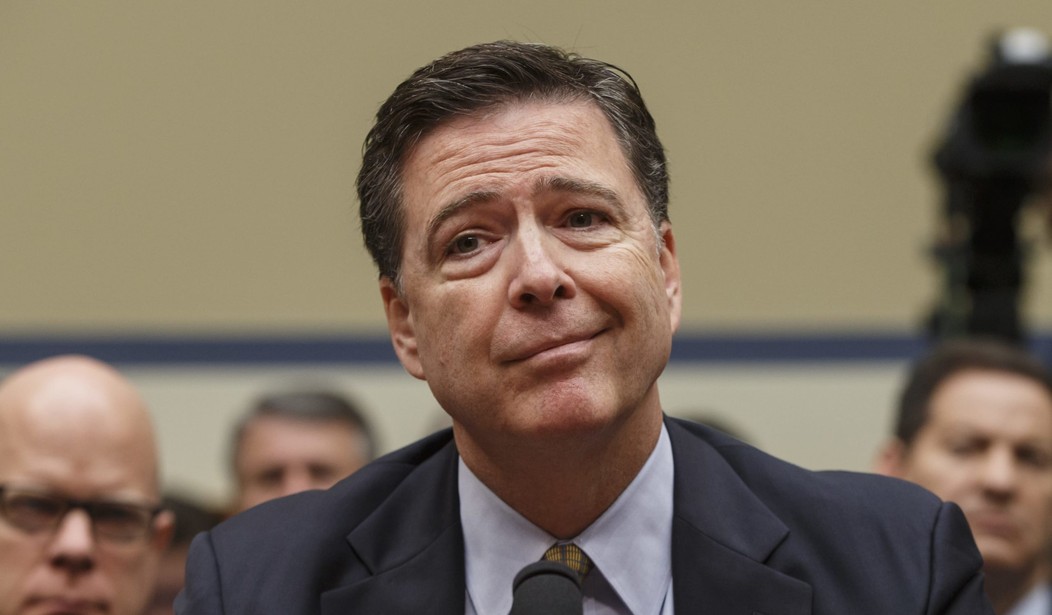FBI Director James Comey returned to the Hill for a third time Wednesday to defend the integrity of the bureau’s investigation into Hillary Clinton’s private email setup, and for a third time he encountered dubious Republicans who peppered him with questions to which he didn’t always have a satisfying answer.
Via Politico:
“You can call us wrong, but don’t call us weasels. We are not weasels,” Comey declared Wednesday at a House Judiciary Committee hearing. “We are honest people and … whether or not you agree with the result, this was done the way you want it to be done.”
The normally stoic FBI chief grew emotional and emphatic as he rejected claims from Republican lawmakers that the FBI was essentially in the tank for Clinton when it recommended that neither she nor any of her aides be prosecuted in connection with the presence of classified information on Clinton’s private email server. He acknowledged he has “no patience” for such allegations.
“I knew there were going to be all kinds of rocks thrown, but this organization and the people who did this are honest, independent people. We do not carry water for one side or the other. That’s hard for people to see because so much of our country, we see things through sides,” Comey said. “We are not on anybody’s side.”
Congressman Trey Gowdy was one of the Republicans trying to get some answers regarding the integrity of the FBI investigation.
He started off by dryly “acknowledging progress” in the Clinton email matter.
Referring to the House Judiciary Committee hearing, he quipped, “This morning we’ve had nine straight Democrats talk to the FBI about emails without asking for immunity.”
“You and I had a discussion last time about intent,” the South Carolina firebrand told Director Comey. “You and I see the statute differently. My opinion doesn’t matter — yours does, you’re the head of the bureau…but in my judgement, you read an element into the statute that does not appear on the face of the statute.”
The former prosecutor agreed that “intent” is often very hard to prove.
“Very rarely do defendants announce ahead of time, ‘I intend to commit this crime on this date. Go ahead and check the code section, I’m gonna do it,'” Gowdy pointed out.
He added, “That rarely happens so you have to prove it by circumstantial evidence.”
Gowdy proceeded to tick off all the ways the “Clinton cover-up operation” (as Platte River Networks employees referred to it) was rife with circumstantial evidence.
Such as:
- “whether or not the person intended to set up an email system outside the State Department.”
- “whether or not the person knew or should have known that his or her job involved handling classified information.”
- “whether or not the person was truthful about the use of multiple devices.”
- “whether or not the person knew that a frequent emailer to her had been hacked and whether she took any remedial steps after being put on notice that your email, or someone who has been emailing with you prolifically, had been hacked.” [Sidney Blumenthal.]
- “whether or not … false exculpatory statements .. such as ‘I neither sent nor received classified information,’ … or ‘I turned over all of my work-related emails,'” were made.
“All of that goes to the issue of intent,” Gowdy declared.
He pressed Comey to explain what Clinton would have to do to warrant the FBI’s recommendation for prosecution.
“If all of that was not enough — because all of that is what she did … surely you can not be arguing that you have to have an intent to harm the United States to be subject to this prosecution? That’s treason — that’s not a violation of this statute,” he said.
Comey answered, “I think we’d have to be able to prove beyond a reasonable doubt a general awareness of the unlawfulness of your conduct. You knew you were doing something you shouldn’t do…. And then you need to consider who else has been prosecuted and in what circumstances because it’s all about prosecutorial judgement. But those two things would be the key questions.”
It would seem that that first standard — a general awareness of the unlawfulness of conduct — was proven beyond a reasonable doubt in the Clinton email case.
“The way to prove that is whether or not someone took steps to conceal or destroy what they’ve done!” Gowdy exclaimed. “That is the best evidence you have that they knew it was wrong! That they lied about it!”
Comey agreed that that is very good evidence. “You always want to look at what the subject said about their conduct,” he conceded.
“Well, there’s a lot!” Gowdy argued. “If you saw her initial press conference, it all falls under the heading of ‘false exculpatory statement.'”
He concluded his time by expressing his bewilderment and frustration at the FBI’s conduct in the case.
“When you have five immunity agreements and no prosecutions, when you are allowing witnesses who happen to be lawyers who happen to be targets to sit in on an interview — that is not the FBI that I used to work with,” Gowdy concluded sadly.
https://youtu.be/X7kQrRMxYec









Join the conversation as a VIP Member